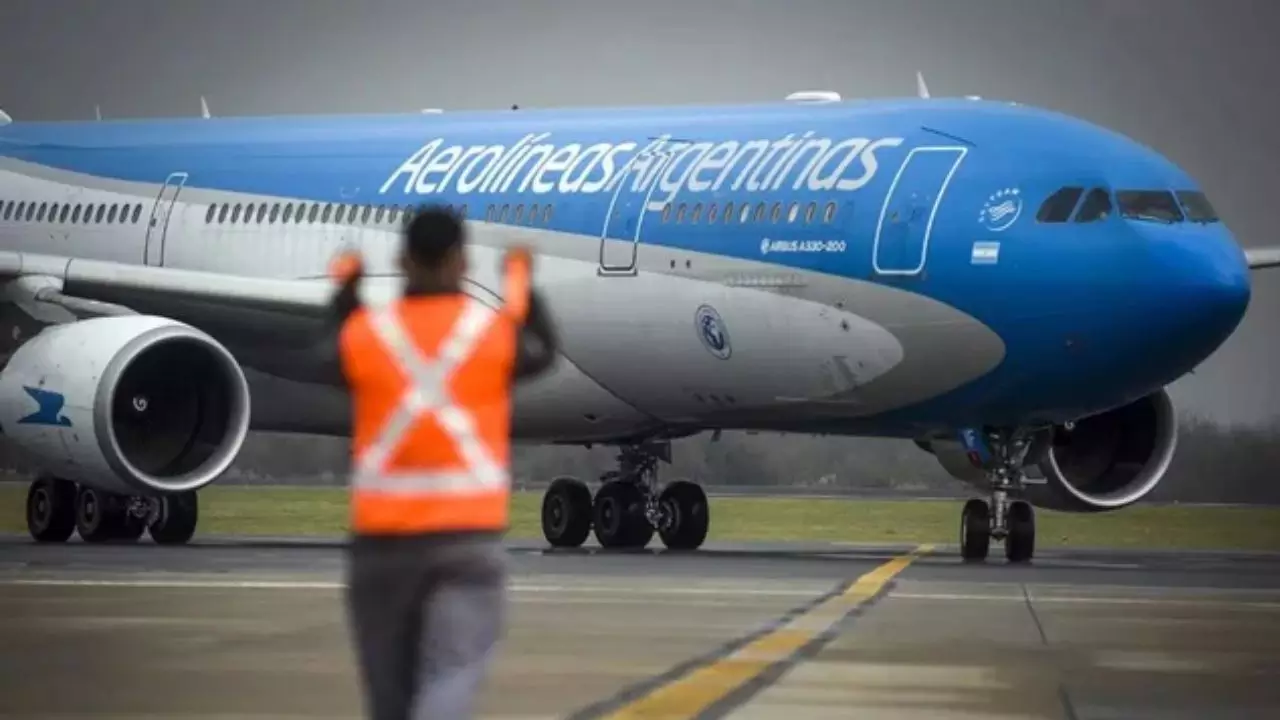
“The national government has begun talks with several private Latin American companies to take over the operation of Aerolíneas, in case the extortions that Argentines are receiving with this type of measures continue,” said presidential spokesman Manuel Adorni at a press conference on Thursday morning.
The exaltation of the free market and the announcements of wanting to advance in “everything that can be privatized” are already part of the roadmap of Milei’s government. However, in order to do so, a law from Congress is required, which does not exist today. In fact, the government had to back down from removing Aerolíneas Argentinas from the list of privatizations in the Bases law after the enormous popular rejection, in order to negotiate the approval of the same and buy the votes of legislators.
The state company transports 11 million passengers per year on almost 95 thousand flights, which means 2 out of every 3 passengers on domestic flights, and connects 22 internal destinations that no other private company reaches. It also transports 1.7 million passengers on international flights, 25% of flights to and from Argentina.
In full swing pandemic within the framework of the organization of special operations to search for health supplies and vaccines, also carried out 384 flights that brought 78,430 stranded people to the countryleading repatriation flights compared to private operators.
Why, if there is no legal framework that allows it, is the government now returning with the intention of privatizing it? Just days after publishing a decree against the right to strike of aeronautical workers by declaring it an “essential service”, the government spokesman’s comments attempt to take advantage of the labor conflict to install the idea that the airline should be privatized.
They blame the workers themselves and accuse them of “extortion” for fighting for their rights, while opening the door to a new private business. The threats seek to break the workers’ organization.
Old arguments like those from the 1990s regarding “private efficiency” in the management of commercial aviation end up emptying it and leading it to bankruptcy. The experience of the Menemist privatizations is a stark example of the true intentions and consequences behind these policies. A stay for millions of Argentines.
They want to finish off Aerolíneas Argentinas. It cannot be allowed. The privatization of the 90s was a disaster. The company went from 30 planes to 1 in private hands. The state rescued it from bankruptcy and closure. Today, Milei, Macri and their friends want to destroy it again so that…
— Christian Castillo (@chipicastillo) September 19, 2024
Privatization and dismantling of the company in the 1990s
In 1989, the Law 23.696 on State Reform It was the first step of the Peronist government of Carlos Menem to promote the privatization of many state-owned companies, including Aerolíneas Argentinas.
A year later, on November 21, 1990, Menem announced the privatization of the flagship airline, after 11 years as a state-owned company. The sale of the company was formalized by Decree No. 2201, which first established the company as a public limited company. The transfer was finally made to the Spanish state-owned company Iberia, in a process that was fraught with irregularities and corruption from the beginning.
The first event of the dismantling was that the Argentine state itself took on the debt of US$ 1,000 million before transferring the company. In other words, the State took charge of the debt and Iberia paid only 260 million dollars in cash. The rest, some 1,610 million, was paid in public securities that at that time were worth little or nothing. In a negotiation in which the concessionaire company was breaching the contract year after year regarding the payment and investment plan.
In this way, the sale was made for three times less than the real value. It was delivered without debt, with 30 of its own aircraft and 10,000 trained workers. To get the money for the purchase, the Spaniards contracted debt: the liabilities were passed on to the company they had just bought.
The first presentation of the privatized company’s balance sheets (June 30, 1991) already revealed the concessionaire’s dealings. This is shown in a report (1994) for CEPAL by Coloma, Gerchunoff and Olmos: “These financial statements not only showed a considerable loss for the first nine months of private management of the airline (equivalent to US$ 26 million), but also revealed a series of aspects that confirmed suspicions regarding the poor financial solidity of the acquiring consortium. Among these aspects, it is worth highlighting the fact that the level of indebtedness – which was supposed to have started from a level of almost zero, since the company was transferred to the private sector without debt – was at the date of the closing of the balance sheet at a level of more than 3 times the value of the firm’s net worth, with the company’s total liabilities amounting to some US$ 840 million. Included in these liabilities were a series of debts that represented unpaid commitments to the government (which Aerolíneas Argentinas valued at around US$140 million), but there was also a large amount made up of debts of the company “with itself” (that is, with companies linked to the acquiring group), among which were around US$360 million of commitments with Spanish banks and around US$63 million of debt with national groups.”
From there, the dismantling of the company began. Iberia got rid of Aerolíneas’ commercial offices in the country and abroad, in addition to selling the fleet of 28 planes, routes, the data processing network, the reservation system and the flight simulators. In addition, it dismantled the workshops. But the capital for all the sales and real estate operations never arrived, neither to Aerolíneas nor to the country. There was no adequate control of the contract, nor of the evolution of the company and its inventory of assets.
In 1994 The Argentine government has renounced its right to oversee strategic decisions such as route and navigation policies.
In 1998the North American company American Airlines joined the company but far from contributing improvements, it was part of another scam: in less than 24 months it withdrew leaving a debt of 874 million dollars.
Following the privatisation of Iberia itself, the company was taken over by Spain’s Sociedad Estatal de Participaciones Industriales (SEPI), which sold it in 2001 to Air Comet, part of the Spanish Marsans group.
Aerolíneas Argentinas was bankrupt in 2001. During De La Rúa’s presidency, the Spanish government was forced to hand over the company to the Marsans group, which acquired 92% of the shares. However, new accusations arose, including the theft of company assets. While rumours of layoffs grew, the Minister of Labour, Patricia Bullrich, warned that the future of Aerolíneas was being determined in a matter of hours. History repeats itself.
In In 1990, Aerolíneas Argentinas had 11,200 employees, an annual turnover of 1.6 billion dollars, profits of 90 million, and 30 of its own aircraft.representative offices in the main capitals of the world and a worldwide recognition that not many aviation companies have achieved. After its privatisation ten years later, there were only 5,500 employees, a fleet of 43 rented planes and only one of its own, an annual turnover of 1 billion dollars, a debt of 850 million dollars, and reduced national and international routes, handed over on the grounds that they were not profitable.
Finally, in 2008, Aerolíneas was renationalized along with Austral Líneas Aéreas through Law No. 26,466. Marsans took the Argentine State to the ICSID (a foreign court that the Argentine government never renounced) for the nationalization and in 2019 obtained a judgment to be compensated in the amount of 320 million dollars.
Staff reduction in the Milei era
According to the latest data from INDEC, in July 2024 the staffing of the flag carrier was 11,386. However, that number does not take into account all the staff outsourced by other companies that operate for Aerolíneas.
Presidential spokesman Manuel Adorni said that in recent months The number of employees was reduced by 1,500“This means a 13% reduction in the workforce,” he said. The company has encouraged voluntary retirements, early retirement agreements and, to a lesser extent, resignations, as part of its downsizing policy.
Airlines are not for sale, if the aeronautical sector wins, we all win
Although the government has not yet succeeded in passing a law that would allow the privatization of Aerolíneas Argentinas to begin, businessmen and the national government are proposing alternatives that are equally alarming, for example, the privatization of some specific sectors, such as technical maintenance of aircraft and ramp services (loading/unloading of baggage and fuel supply) or the sale of various public companies in the sector, such as Intercargo or EANA (Empresa Argentina de Navegación Aérea).
Mauricio Macri joined the privatization campaign, where in a tweet he proposed, in the same sense, to advance towards ending labor rights acquired in collective agreements and directly through the dismantling and auctioning of the company’s assets and its areas of activity.
What airline do we need?
Aerolíneas Argentinas must have a social role and not be a company that competes to make a profit. The Government wants to declare the activity essential, but not to extend the service to more places, to make it quality and economical, but to attack the organization of the workers and their achievements. They are the true “forces of heaven” that put the company into operation day after day. It is necessary a true flag carrier that connects the entire population with cheap tickets and that we can all access an affordable and quality service that takes into account the needs of all the people.
One has to Surround Aerolíneas workers facing layoffs with solidaritywage cuts, attacks on the right to strike and threats of privatisation. We need to unite all the struggles of pensioners, education and universities that showed enormous support.
Last Sunday Milei presented an adjustment budget at the request of the IMFin a half-empty Congress with very low television audiences. It showed that joins forces with the worst of the caste to steal from retireesThese attacks can only happen with the complicity of the trade unions that have given Milei a truce. A real plan of struggle is needed, in unity of all sectors of the workers, of the youth and of the women’s movement and dissidents to overthrow the attacks of the Government and the IMF.
Source: www.laizquierdadiario.com

